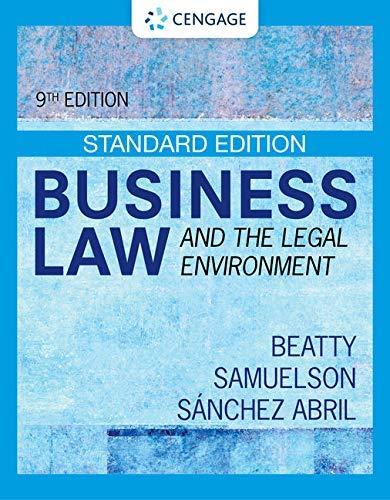Question
Exploring the Consumer-Centric Provisions of Section 75 of the CCA 1974 - Balancing Creditor Liability and Consumer Protection: Section 75 of the CCA 1974 plays
Exploring the Consumer-Centric Provisions of Section 75 of the CCA 1974 - Balancing Creditor Liability and Consumer Protection:
Section 75 of the CCA 1974 plays a central role in the debate over whether the Act is biased towards consumers, by extending significant protections to consumers by making creditors jointly and severally liable for breaches of contract or misrepresentations by suppliers in certain credit transactions.[1]
The pro-consumer bias of Section 75 is underscored by landmark case law. In Office of Fair Trading v Lloyds TSB Bank Plc, the House of Lords affirmed the broad scope of creditor liability under Section 75, even enabling consumers to claim against UK creditors for supplier breaches abroad.[2] This decision highlighted the protective intent of the CCA 1974, extending its reach beyond domestic transactions to provide global safeguards for consumers engaging in international commerce.
Critics from the credit industry argue that such decisions and the statute itself place an undue burden on creditors, who must shoulder the risk of supplier defaults that are often beyond their control.[3] However, this interpretation aligns with the CCA 1974s foundational goal: to protect consumers from the inherent risks and imbalances in credit agreements, which were less regulated before the Act's implementation.[4]
Further analysis of case law, such as Durkin v DSG Retail Ltd, reveals how Section 75 has been instrumental in clarifying the extent of creditor liability.[5] In this case, the Supreme Court affirmed that consumers could rescind a credit agreement when goods are misdescribed, emphasising the creditor's duty to ensure accurate representations in consumer contracts.[6]
Thus, Section 75 of the CCA 1974 ostensibly favours consumers by holding creditors accountable for their commercial partners' conduct, even abroad. This protective measure, whilst (perhaps) being seen as biased against creditors, could be argued as crucial for maintaining consumer confidence and fairness in complex credit markets.
[1] Consumer Credit Act 1974, s 75.
[2] Office of Fair Trading v Lloyds TSB Bank Plc [2007] UKHL 48.
[3] Robert Stokes, Commercial Law (10th edn, Sweet & Maxwell 2022) p 445.
[4] Reforming the Consumer Credit Act 1974 Consultation Response. HM Treasury (July 2023)
[5] Durkin v DSG Retail Ltd [2014] UKSC 21.
[6] ibid.
Respond to the above using OSCOLA references. Give References for the response. You may address aspects which include the following:
Consider the application of section 75. Consider the position prior to the establishment of the Act. Consider the reason for establishing the CCA and aspects relating to creditor's liability which have proved difficult to interpret. Assess the different cases on creditor's liability and how they have influenced the development of the statute. Consider whether the law offers protection for debtors and how the law balances the interest of creditors.
Step by Step Solution
There are 3 Steps involved in it
Step: 1

Get Instant Access to Expert-Tailored Solutions
See step-by-step solutions with expert insights and AI powered tools for academic success
Step: 2

Step: 3

Ace Your Homework with AI
Get the answers you need in no time with our AI-driven, step-by-step assistance
Get Started


